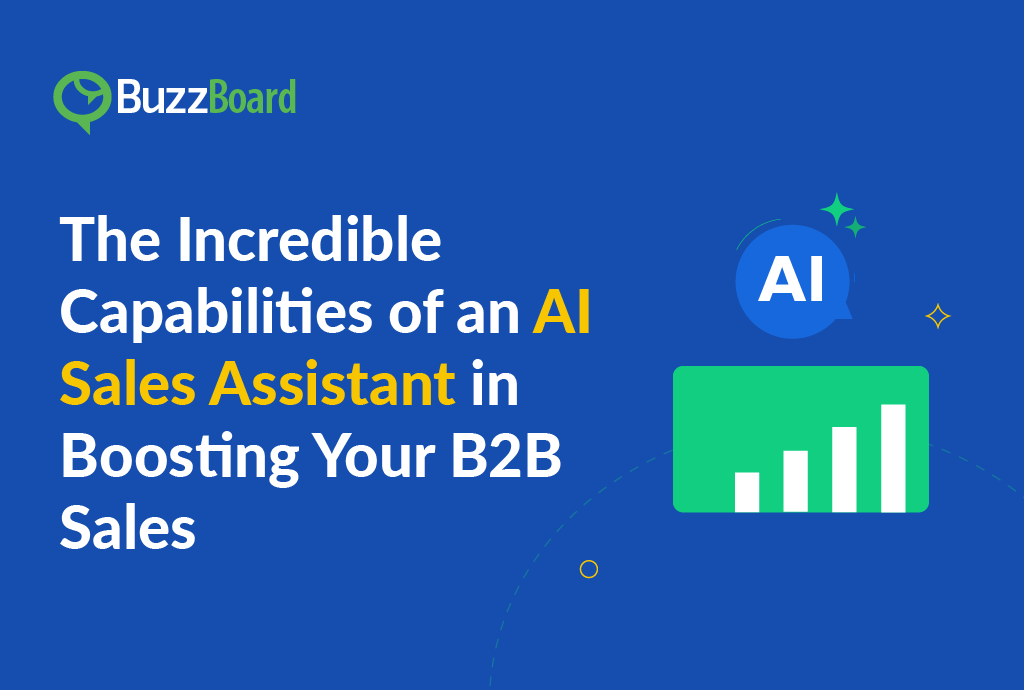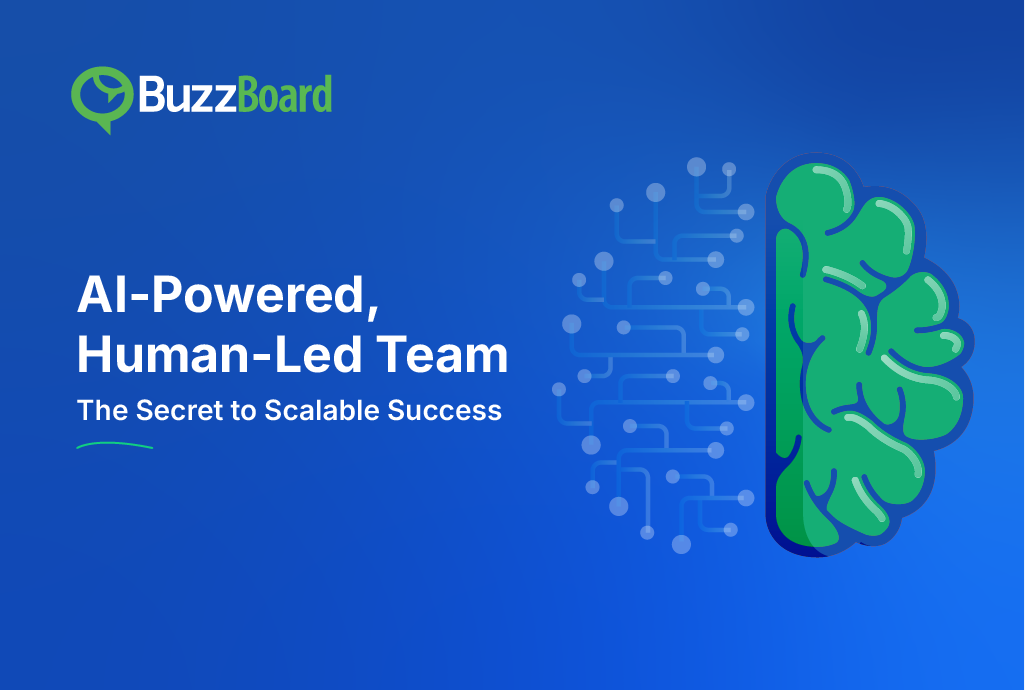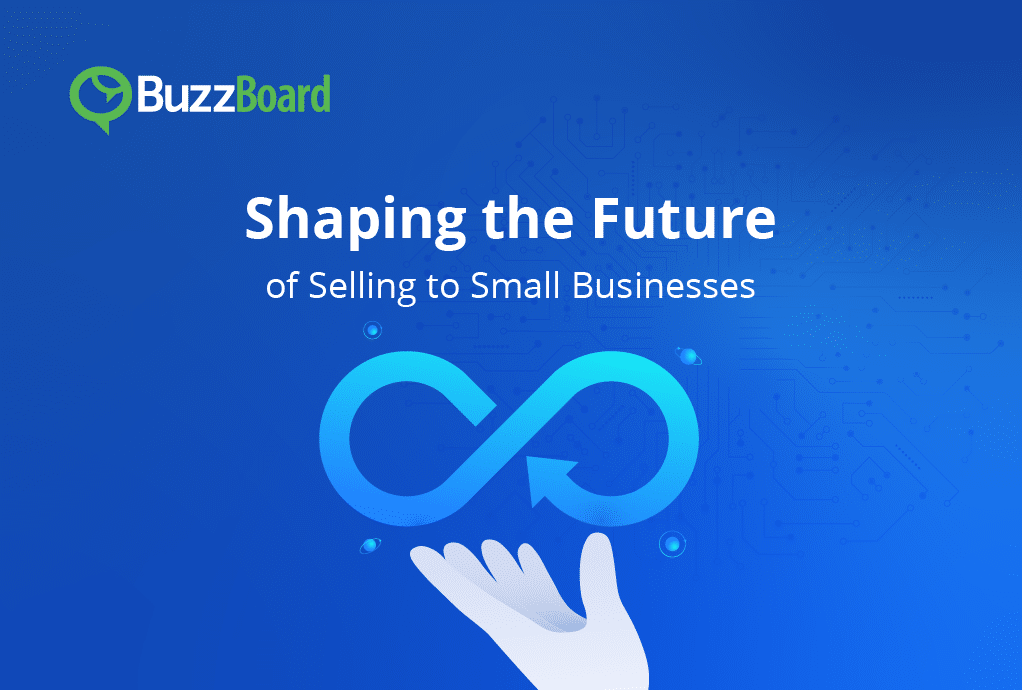In the high-stakes world of B2B sales, the game is all about seizing opportunities, outpacing the competition, and forging lasting connections with clients. But then everyday reps have to cope with the painstaking task of sorting through leads, repetitive administrative chores, and more. Thankfully, some reps already have AI sales assistants to their rescue that automate the mundane, handling everything from scheduling meetings to updating crucial databases and empowering your team to focus on what truly matters: cultivating relationships and closing deals.
Well, this isn’t another futuristic dream! The AI sales assistants today not only understand your clients but anticipate their needs with uncanny accuracy. In fact, it’s the reality of leveraging AI to decode customer preferences and craft personalized interactions that resonate deeply.
So if you wish to propel your B2B business’s growth, it’s high time that you bid farewell to the daunting task of lead management and cumbersome sales cycle. Because there’s an innovation waiting to revolutionize the way you do sales. So learn and uncover the transformative power of AI in B2B sales—where technology meets strategy, and possibilities abound.
What Is an AI Sales Assistant?
Let’s get down to the nuts and bolts. In short, an AI sales assistant is your modern-day sales superhero—a dynamic blend of artificial intelligence and sales expertise. It is a digital tool seamlessly integrated into your team, revolutionizing the sales process.
Things an AI Sales Assistant Can Do for Your B2B Business
1. Personalized Customer Interactions
The ability to provide customized and meaningful interactions to potential customers can be the difference between closing deals and losing out. While truly personalized engagement has always been ideal, it has remained largely impractical without the right tools and resources. This is where AI-powered sales assistants come in with the promise of revolutionizing how B2B organizations connect to their customers.
Sophisticated natural language processing capabilities enable AI sales assistants to analyze conversations, emails, and all customer information in CRM systems to form an intricate understanding of each prospect. This includes sentiment, communication style, stated and unstated needs, role in the company, industry-specific interests, and pain points. With this 360-degree view, sales reps can receive next-step recommendations, talking points, and content tailored to building trust and value with each lead.
For example, B2SMB-focused AI-powered sales platform BuzzBoard is dismissing the dominance of templates with its hyper-personalized prospecting techniques. Their mission is to empower sales reps and make them feel valued and appreciated as members of their community. BuzzBoard’s hyper-personalization content machine for B2SMB sellers makes every email, every text message, and every outreach effort bespoke for every prospect… so that reps can pitch their products and services with precision to align with prospects’ needs and maximize engagement.
2. Lead Qualification, Scoring, and Nurturing
An AI sales assistant employs sophisticated algorithms to assess leads, diving deep into data to analyze behaviors, preferences, and engagement patterns. It doesn’t just stop at surface-level interest; it distinguishes the promising leads from the crowd by gauging buying signals, behaviors, and patterns that indicate a lead’s readiness to convert. Next, it employs strategic nurturing tactics, providing targeted communications and guidance that move prospects through the sales funnel… closer to conversion. Basically, sales assistants ensure that your sales team focuses its efforts on the most promising avenues.
But AI assistants are no one-trick pony. They continuously learn from interactions, refining its lead qualification, scoring, and nurturing strategies based on real-time feedback. They keep evolving and adapting to changing market dynamics and lead behaviors.
3. CRM Updates and Scheduling Meetings
Administrative tasks can be the Achilles’ heel of productivity in B2B sales ops. Well, an AI sales assistant is the other name for efficiency! It’s your tireless ally, seamlessly integrated into your team, effortlessly managing the nitty-gritty of CRM updates. Its duties include updating databases, making certain that every piece of crucial information is accurate and up-to-date. Contacts, interactions, and crucial details—all handled with precision, leaving your team free from the burden of manual data entry.
Looking for more time-saving qualities? Picture an assistant that’s a scheduling virtuoso, eliminating the hassle of back-and-forth emails to fix meeting times. AI assistants not only coordinate schedules but anticipate preferences and time zones, so that you can dive straight into seamless, conflict-free meetings.
4. Data-Driven Decision-Making
In an increasingly unpredictable market, B2B sales organizations cannot afford reactionary or half-blind strategies. Organizations need precise, actionable insights powered by objective data analysis to drive growth. However, with siloed customer data spread across an ever-expanding stack of sales and marketing technologies, unlocking transparency can feel impossible. Just understanding what to measure—let alone connecting the dots on what activities actually drive outcomes—has become a herculean task. This is where AI-powered sales assistants come in as the ultimate analytics and intelligence engine for B2B leaders!
By flawlessly integrating with existing martech and CRM stacks, AI assistants structurally organize every customer interaction and activity into a single source of truth. No more guessing which content assets or campaigns influence deal cycles or forecast accuracy. Granular visibility through ML-enriched dashboards shows exact touchpoint attribution to let sales executives know precisely what works to convert leads faster.
Multiple Ways an AI Sales Assistant Is Benefitting Your B2B Business
Now that you’re aware of how AI is assisting your business to grab the right opportunities at the right time, let’s quickly appreciate the list of benefits it offers to B2Bs and B2SMBs:
- Increases sales productivity by automating mundane jobs
- Makes informed sales strategies with the help of data-driven decision-making
- Improves customer experience by having personalization at play
- Reduces risk of human error by warranting accuracy and reliability
Probably, that world is not far away where every customer feels understood and every lead is nurtured with precision. That’s the reality of harnessing the power of an AI Sales Assistant—a reality where efficiency meets personalization.
But perhaps its greatest strength lies in its adaptability, its perpetual learning, and its unwavering commitment to excellence. As technology evolves and customer expectations shift, AI Sales Assistants evolve with them, ensuring your business remains agile, responsive, and poised for success.








